Contract Law: Analysis of Frustration in Contract Scenarios, LLB
VerifiedAdded on 2022/09/23
|8
|2058
|25
Report
AI Summary
This report analyzes three contract scenarios to determine if the doctrine of frustration applies. The first contract involves cookery workshops disrupted by floods, assessing if the contract with Giorgio is frustrated due to impossibility of performance. The second contract examines a carpet fitting agreement and whether a company's refusal to perform due to price increases constitutes frustration. The third contract concerns a sofa repair, evaluating if the contract between Rehnaz and Siobhán is frustrated because the third party cancelled the engagement. The report applies legal principles, including impossibility, commercial purpose, and relevant case law such as *Robinson v Davison* and *Davis Contractors v Fareham UDC*, to reach conclusions on the validity of each contract and potential remedies. The report also references the Law Reform (Frustrated Contracts) Act 1943.

Contract law
Paraphrase This Document
Need a fresh take? Get an instant paraphrase of this document with our AI Paraphraser
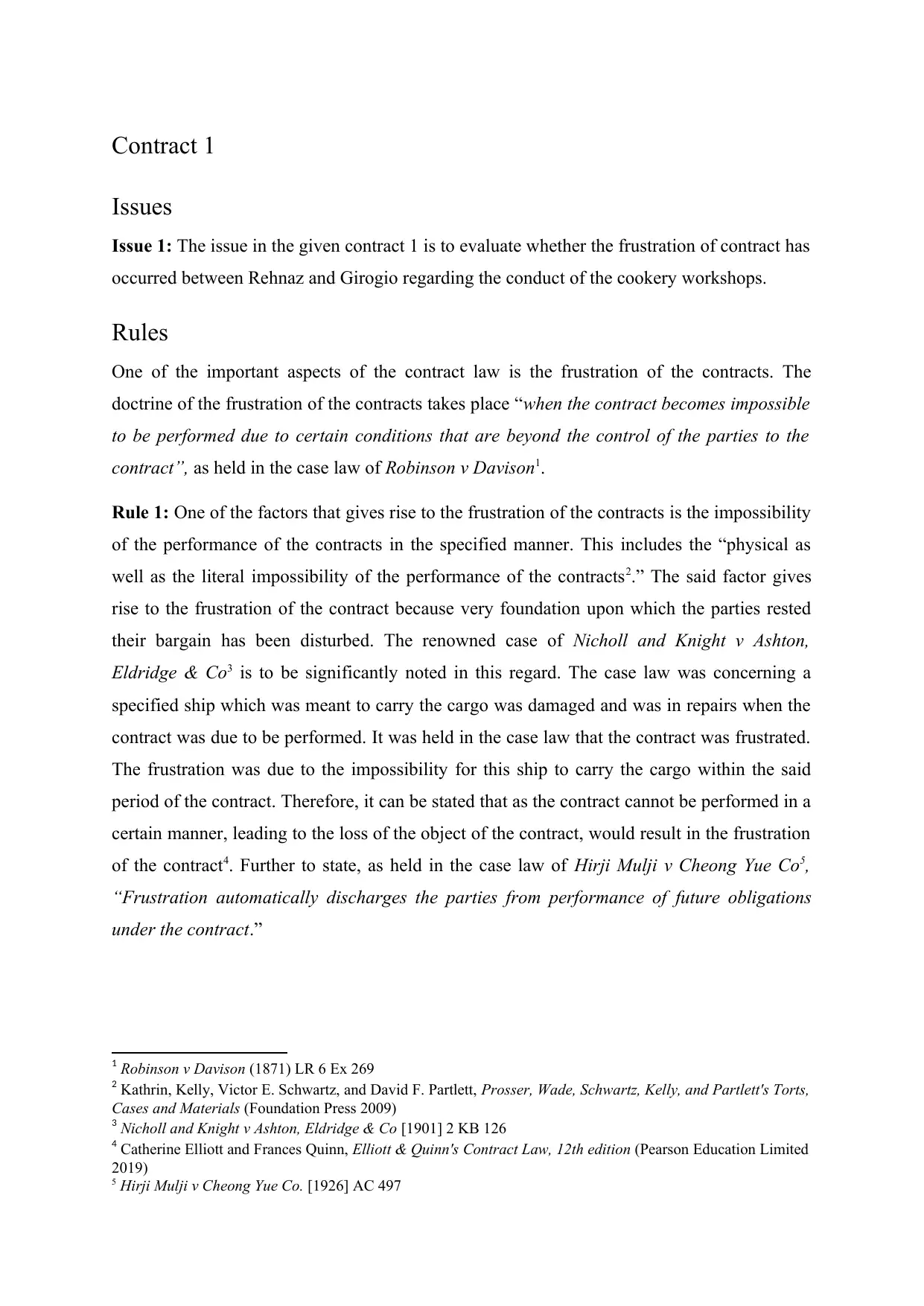
Contract 1
Issues
Issue 1: The issue in the given contract 1 is to evaluate whether the frustration of contract has
occurred between Rehnaz and Girogio regarding the conduct of the cookery workshops.
Rules
One of the important aspects of the contract law is the frustration of the contracts. The
doctrine of the frustration of the contracts takes place “when the contract becomes impossible
to be performed due to certain conditions that are beyond the control of the parties to the
contract”, as held in the case law of Robinson v Davison1.
Rule 1: One of the factors that gives rise to the frustration of the contracts is the impossibility
of the performance of the contracts in the specified manner. This includes the “physical as
well as the literal impossibility of the performance of the contracts2.” The said factor gives
rise to the frustration of the contract because very foundation upon which the parties rested
their bargain has been disturbed. The renowned case of Nicholl and Knight v Ashton,
Eldridge & Co3 is to be significantly noted in this regard. The case law was concerning a
specified ship which was meant to carry the cargo was damaged and was in repairs when the
contract was due to be performed. It was held in the case law that the contract was frustrated.
The frustration was due to the impossibility for this ship to carry the cargo within the said
period of the contract. Therefore, it can be stated that as the contract cannot be performed in a
certain manner, leading to the loss of the object of the contract, would result in the frustration
of the contract4. Further to state, as held in the case law of Hirji Mulji v Cheong Yue Co5,
“Frustration automatically discharges the parties from performance of future obligations
under the contract.”
1 Robinson v Davison (1871) LR 6 Ex 269
2 Kathrin, Kelly, Victor E. Schwartz, and David F. Partlett, Prosser, Wade, Schwartz, Kelly, and Partlett's Torts,
Cases and Materials (Foundation Press 2009)
3 Nicholl and Knight v Ashton, Eldridge & Co [1901] 2 KB 126
4 Catherine Elliott and Frances Quinn, Elliott & Quinn's Contract Law, 12th edition (Pearson Education Limited
2019)
5 Hirji Mulji v Cheong Yue Co. [1926] AC 497
Issues
Issue 1: The issue in the given contract 1 is to evaluate whether the frustration of contract has
occurred between Rehnaz and Girogio regarding the conduct of the cookery workshops.
Rules
One of the important aspects of the contract law is the frustration of the contracts. The
doctrine of the frustration of the contracts takes place “when the contract becomes impossible
to be performed due to certain conditions that are beyond the control of the parties to the
contract”, as held in the case law of Robinson v Davison1.
Rule 1: One of the factors that gives rise to the frustration of the contracts is the impossibility
of the performance of the contracts in the specified manner. This includes the “physical as
well as the literal impossibility of the performance of the contracts2.” The said factor gives
rise to the frustration of the contract because very foundation upon which the parties rested
their bargain has been disturbed. The renowned case of Nicholl and Knight v Ashton,
Eldridge & Co3 is to be significantly noted in this regard. The case law was concerning a
specified ship which was meant to carry the cargo was damaged and was in repairs when the
contract was due to be performed. It was held in the case law that the contract was frustrated.
The frustration was due to the impossibility for this ship to carry the cargo within the said
period of the contract. Therefore, it can be stated that as the contract cannot be performed in a
certain manner, leading to the loss of the object of the contract, would result in the frustration
of the contract4. Further to state, as held in the case law of Hirji Mulji v Cheong Yue Co5,
“Frustration automatically discharges the parties from performance of future obligations
under the contract.”
1 Robinson v Davison (1871) LR 6 Ex 269
2 Kathrin, Kelly, Victor E. Schwartz, and David F. Partlett, Prosser, Wade, Schwartz, Kelly, and Partlett's Torts,
Cases and Materials (Foundation Press 2009)
3 Nicholl and Knight v Ashton, Eldridge & Co [1901] 2 KB 126
4 Catherine Elliott and Frances Quinn, Elliott & Quinn's Contract Law, 12th edition (Pearson Education Limited
2019)
5 Hirji Mulji v Cheong Yue Co. [1926] AC 497
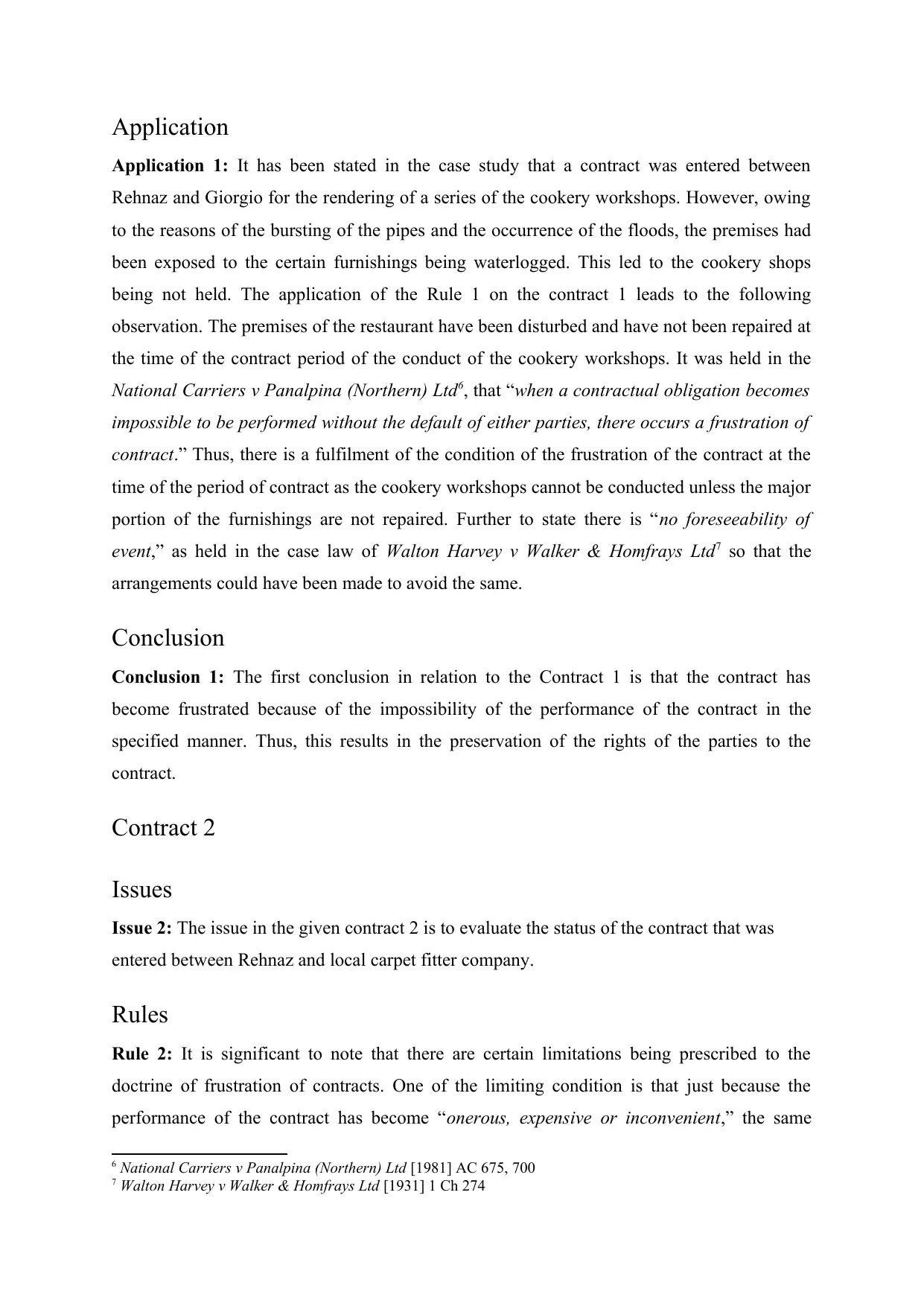
Application
Application 1: It has been stated in the case study that a contract was entered between
Rehnaz and Giorgio for the rendering of a series of the cookery workshops. However, owing
to the reasons of the bursting of the pipes and the occurrence of the floods, the premises had
been exposed to the certain furnishings being waterlogged. This led to the cookery shops
being not held. The application of the Rule 1 on the contract 1 leads to the following
observation. The premises of the restaurant have been disturbed and have not been repaired at
the time of the contract period of the conduct of the cookery workshops. It was held in the
National Carriers v Panalpina (Northern) Ltd6, that “when a contractual obligation becomes
impossible to be performed without the default of either parties, there occurs a frustration of
contract.” Thus, there is a fulfilment of the condition of the frustration of the contract at the
time of the period of contract as the cookery workshops cannot be conducted unless the major
portion of the furnishings are not repaired. Further to state there is “no foreseeability of
event,” as held in the case law of Walton Harvey v Walker & Homfrays Ltd7 so that the
arrangements could have been made to avoid the same.
Conclusion
Conclusion 1: The first conclusion in relation to the Contract 1 is that the contract has
become frustrated because of the impossibility of the performance of the contract in the
specified manner. Thus, this results in the preservation of the rights of the parties to the
contract.
Contract 2
Issues
Issue 2: The issue in the given contract 2 is to evaluate the status of the contract that was
entered between Rehnaz and local carpet fitter company.
Rules
Rule 2: It is significant to note that there are certain limitations being prescribed to the
doctrine of frustration of contracts. One of the limiting condition is that just because the
performance of the contract has become “onerous, expensive or inconvenient,” the same
6 National Carriers v Panalpina (Northern) Ltd [1981] AC 675, 700
7 Walton Harvey v Walker & Homfrays Ltd [1931] 1 Ch 274
Application 1: It has been stated in the case study that a contract was entered between
Rehnaz and Giorgio for the rendering of a series of the cookery workshops. However, owing
to the reasons of the bursting of the pipes and the occurrence of the floods, the premises had
been exposed to the certain furnishings being waterlogged. This led to the cookery shops
being not held. The application of the Rule 1 on the contract 1 leads to the following
observation. The premises of the restaurant have been disturbed and have not been repaired at
the time of the contract period of the conduct of the cookery workshops. It was held in the
National Carriers v Panalpina (Northern) Ltd6, that “when a contractual obligation becomes
impossible to be performed without the default of either parties, there occurs a frustration of
contract.” Thus, there is a fulfilment of the condition of the frustration of the contract at the
time of the period of contract as the cookery workshops cannot be conducted unless the major
portion of the furnishings are not repaired. Further to state there is “no foreseeability of
event,” as held in the case law of Walton Harvey v Walker & Homfrays Ltd7 so that the
arrangements could have been made to avoid the same.
Conclusion
Conclusion 1: The first conclusion in relation to the Contract 1 is that the contract has
become frustrated because of the impossibility of the performance of the contract in the
specified manner. Thus, this results in the preservation of the rights of the parties to the
contract.
Contract 2
Issues
Issue 2: The issue in the given contract 2 is to evaluate the status of the contract that was
entered between Rehnaz and local carpet fitter company.
Rules
Rule 2: It is significant to note that there are certain limitations being prescribed to the
doctrine of frustration of contracts. One of the limiting condition is that just because the
performance of the contract has become “onerous, expensive or inconvenient,” the same
6 National Carriers v Panalpina (Northern) Ltd [1981] AC 675, 700
7 Walton Harvey v Walker & Homfrays Ltd [1931] 1 Ch 274
⊘ This is a preview!⊘
Do you want full access?
Subscribe today to unlock all pages.

Trusted by 1+ million students worldwide
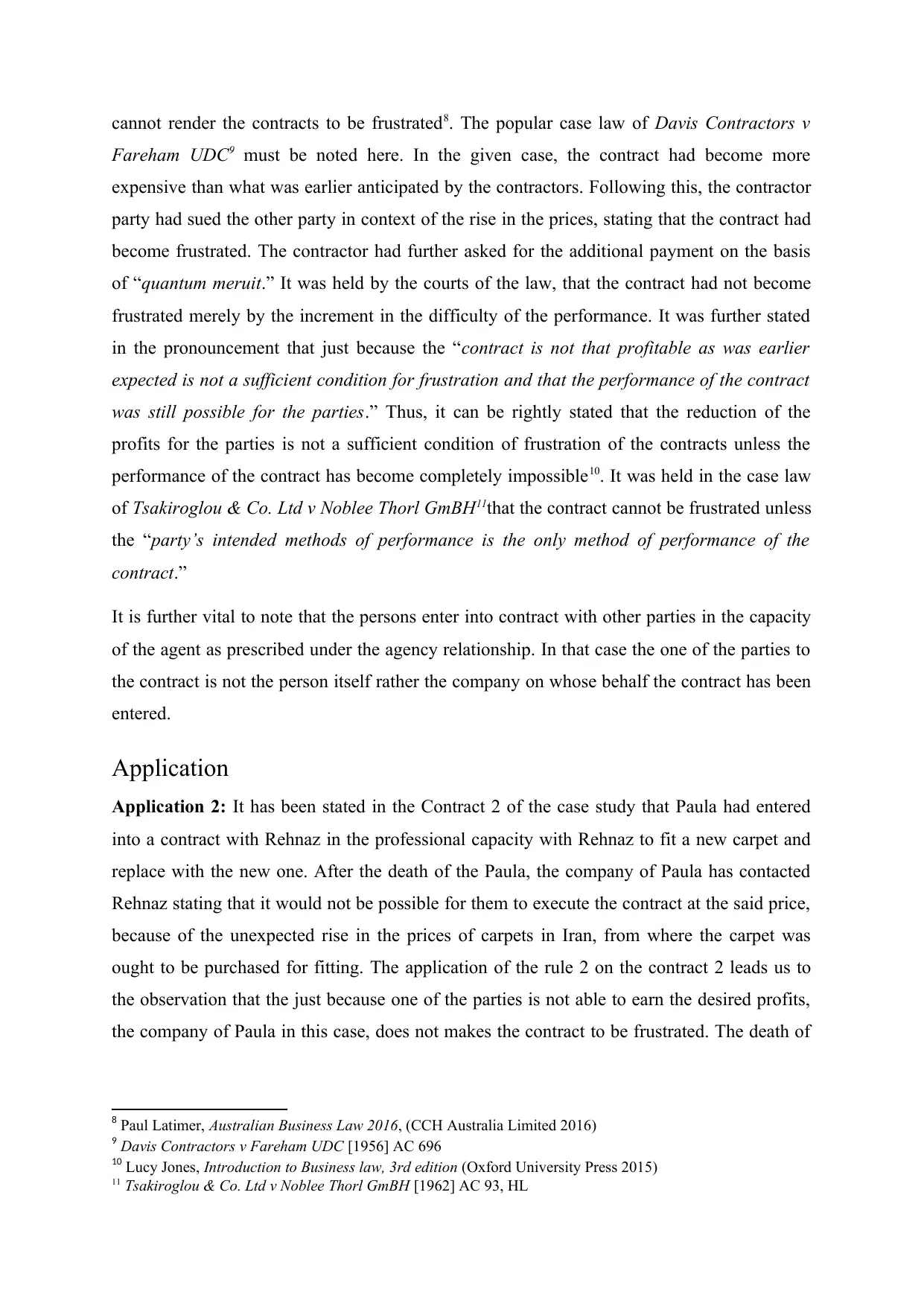
cannot render the contracts to be frustrated8. The popular case law of Davis Contractors v
Fareham UDC9 must be noted here. In the given case, the contract had become more
expensive than what was earlier anticipated by the contractors. Following this, the contractor
party had sued the other party in context of the rise in the prices, stating that the contract had
become frustrated. The contractor had further asked for the additional payment on the basis
of “quantum meruit.” It was held by the courts of the law, that the contract had not become
frustrated merely by the increment in the difficulty of the performance. It was further stated
in the pronouncement that just because the “contract is not that profitable as was earlier
expected is not a sufficient condition for frustration and that the performance of the contract
was still possible for the parties.” Thus, it can be rightly stated that the reduction of the
profits for the parties is not a sufficient condition of frustration of the contracts unless the
performance of the contract has become completely impossible10. It was held in the case law
of Tsakiroglou & Co. Ltd v Noblee Thorl GmBH11that the contract cannot be frustrated unless
the “party’s intended methods of performance is the only method of performance of the
contract.”
It is further vital to note that the persons enter into contract with other parties in the capacity
of the agent as prescribed under the agency relationship. In that case the one of the parties to
the contract is not the person itself rather the company on whose behalf the contract has been
entered.
Application
Application 2: It has been stated in the Contract 2 of the case study that Paula had entered
into a contract with Rehnaz in the professional capacity with Rehnaz to fit a new carpet and
replace with the new one. After the death of the Paula, the company of Paula has contacted
Rehnaz stating that it would not be possible for them to execute the contract at the said price,
because of the unexpected rise in the prices of carpets in Iran, from where the carpet was
ought to be purchased for fitting. The application of the rule 2 on the contract 2 leads us to
the observation that the just because one of the parties is not able to earn the desired profits,
the company of Paula in this case, does not makes the contract to be frustrated. The death of
8 Paul Latimer, Australian Business Law 2016, (CCH Australia Limited 2016)
9 Davis Contractors v Fareham UDC [1956] AC 696
10 Lucy Jones, Introduction to Business law, 3rd edition (Oxford University Press 2015)
11 Tsakiroglou & Co. Ltd v Noblee Thorl GmBH [1962] AC 93, HL
Fareham UDC9 must be noted here. In the given case, the contract had become more
expensive than what was earlier anticipated by the contractors. Following this, the contractor
party had sued the other party in context of the rise in the prices, stating that the contract had
become frustrated. The contractor had further asked for the additional payment on the basis
of “quantum meruit.” It was held by the courts of the law, that the contract had not become
frustrated merely by the increment in the difficulty of the performance. It was further stated
in the pronouncement that just because the “contract is not that profitable as was earlier
expected is not a sufficient condition for frustration and that the performance of the contract
was still possible for the parties.” Thus, it can be rightly stated that the reduction of the
profits for the parties is not a sufficient condition of frustration of the contracts unless the
performance of the contract has become completely impossible10. It was held in the case law
of Tsakiroglou & Co. Ltd v Noblee Thorl GmBH11that the contract cannot be frustrated unless
the “party’s intended methods of performance is the only method of performance of the
contract.”
It is further vital to note that the persons enter into contract with other parties in the capacity
of the agent as prescribed under the agency relationship. In that case the one of the parties to
the contract is not the person itself rather the company on whose behalf the contract has been
entered.
Application
Application 2: It has been stated in the Contract 2 of the case study that Paula had entered
into a contract with Rehnaz in the professional capacity with Rehnaz to fit a new carpet and
replace with the new one. After the death of the Paula, the company of Paula has contacted
Rehnaz stating that it would not be possible for them to execute the contract at the said price,
because of the unexpected rise in the prices of carpets in Iran, from where the carpet was
ought to be purchased for fitting. The application of the rule 2 on the contract 2 leads us to
the observation that the just because one of the parties is not able to earn the desired profits,
the company of Paula in this case, does not makes the contract to be frustrated. The death of
8 Paul Latimer, Australian Business Law 2016, (CCH Australia Limited 2016)
9 Davis Contractors v Fareham UDC [1956] AC 696
10 Lucy Jones, Introduction to Business law, 3rd edition (Oxford University Press 2015)
11 Tsakiroglou & Co. Ltd v Noblee Thorl GmBH [1962] AC 93, HL
Paraphrase This Document
Need a fresh take? Get an instant paraphrase of this document with our AI Paraphraser
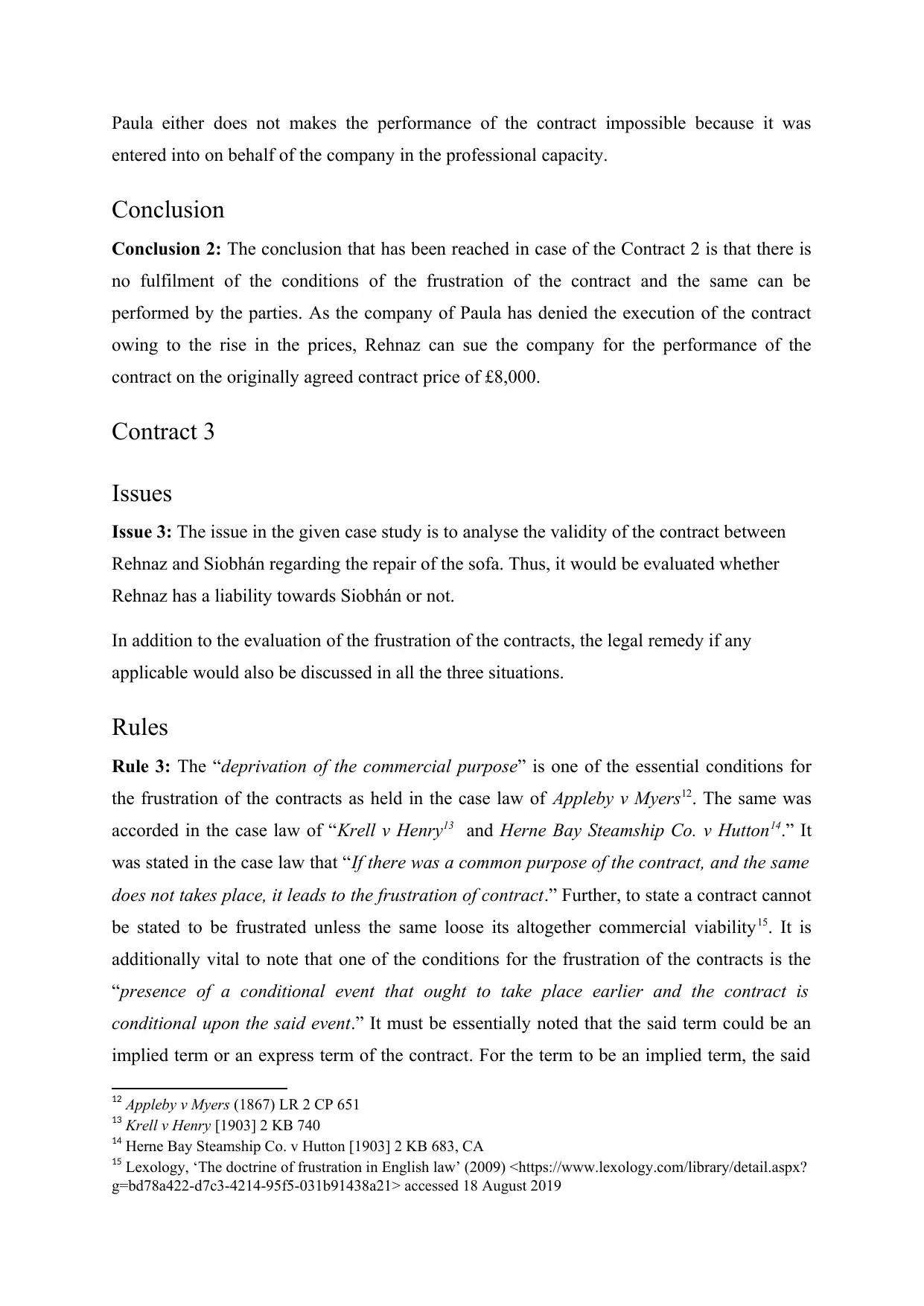
Paula either does not makes the performance of the contract impossible because it was
entered into on behalf of the company in the professional capacity.
Conclusion
Conclusion 2: The conclusion that has been reached in case of the Contract 2 is that there is
no fulfilment of the conditions of the frustration of the contract and the same can be
performed by the parties. As the company of Paula has denied the execution of the contract
owing to the rise in the prices, Rehnaz can sue the company for the performance of the
contract on the originally agreed contract price of £8,000.
Contract 3
Issues
Issue 3: The issue in the given case study is to analyse the validity of the contract between
Rehnaz and Siobhán regarding the repair of the sofa. Thus, it would be evaluated whether
Rehnaz has a liability towards Siobhán or not.
In addition to the evaluation of the frustration of the contracts, the legal remedy if any
applicable would also be discussed in all the three situations.
Rules
Rule 3: The “deprivation of the commercial purpose” is one of the essential conditions for
the frustration of the contracts as held in the case law of Appleby v Myers12. The same was
accorded in the case law of “Krell v Henry13 and Herne Bay Steamship Co. v Hutton14.” It
was stated in the case law that “If there was a common purpose of the contract, and the same
does not takes place, it leads to the frustration of contract.” Further, to state a contract cannot
be stated to be frustrated unless the same loose its altogether commercial viability15. It is
additionally vital to note that one of the conditions for the frustration of the contracts is the
“presence of a conditional event that ought to take place earlier and the contract is
conditional upon the said event.” It must be essentially noted that the said term could be an
implied term or an express term of the contract. For the term to be an implied term, the said
12 Appleby v Myers (1867) LR 2 CP 651
13 Krell v Henry [1903] 2 KB 740
14 Herne Bay Steamship Co. v Hutton [1903] 2 KB 683, CA
15 Lexology, ‘The doctrine of frustration in English law’ (2009) <https://www.lexology.com/library/detail.aspx?
g=bd78a422-d7c3-4214-95f5-031b91438a21> accessed 18 August 2019
entered into on behalf of the company in the professional capacity.
Conclusion
Conclusion 2: The conclusion that has been reached in case of the Contract 2 is that there is
no fulfilment of the conditions of the frustration of the contract and the same can be
performed by the parties. As the company of Paula has denied the execution of the contract
owing to the rise in the prices, Rehnaz can sue the company for the performance of the
contract on the originally agreed contract price of £8,000.
Contract 3
Issues
Issue 3: The issue in the given case study is to analyse the validity of the contract between
Rehnaz and Siobhán regarding the repair of the sofa. Thus, it would be evaluated whether
Rehnaz has a liability towards Siobhán or not.
In addition to the evaluation of the frustration of the contracts, the legal remedy if any
applicable would also be discussed in all the three situations.
Rules
Rule 3: The “deprivation of the commercial purpose” is one of the essential conditions for
the frustration of the contracts as held in the case law of Appleby v Myers12. The same was
accorded in the case law of “Krell v Henry13 and Herne Bay Steamship Co. v Hutton14.” It
was stated in the case law that “If there was a common purpose of the contract, and the same
does not takes place, it leads to the frustration of contract.” Further, to state a contract cannot
be stated to be frustrated unless the same loose its altogether commercial viability15. It is
additionally vital to note that one of the conditions for the frustration of the contracts is the
“presence of a conditional event that ought to take place earlier and the contract is
conditional upon the said event.” It must be essentially noted that the said term could be an
implied term or an express term of the contract. For the term to be an implied term, the said
12 Appleby v Myers (1867) LR 2 CP 651
13 Krell v Henry [1903] 2 KB 740
14 Herne Bay Steamship Co. v Hutton [1903] 2 KB 683, CA
15 Lexology, ‘The doctrine of frustration in English law’ (2009) <https://www.lexology.com/library/detail.aspx?
g=bd78a422-d7c3-4214-95f5-031b91438a21> accessed 18 August 2019
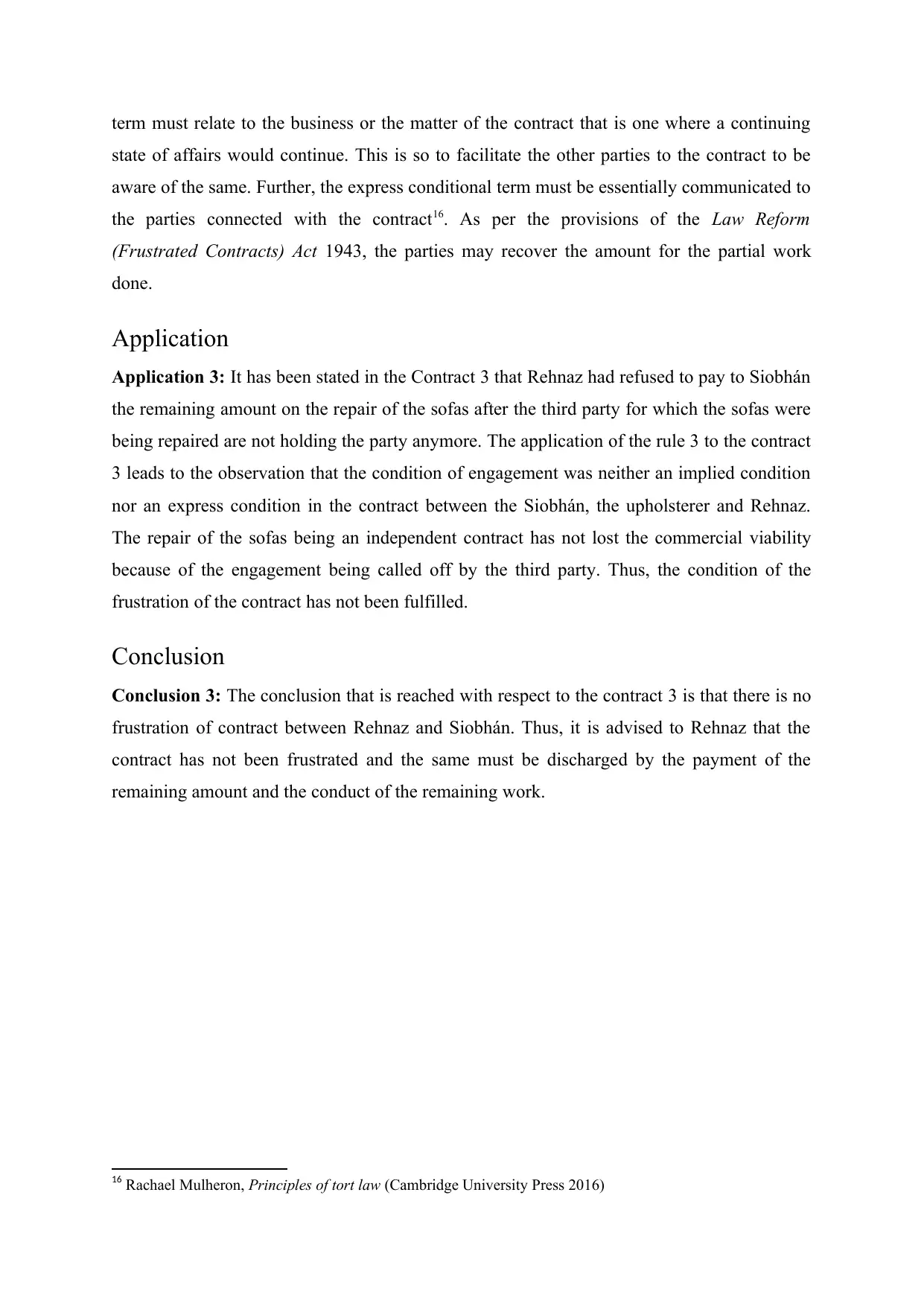
term must relate to the business or the matter of the contract that is one where a continuing
state of affairs would continue. This is so to facilitate the other parties to the contract to be
aware of the same. Further, the express conditional term must be essentially communicated to
the parties connected with the contract16. As per the provisions of the Law Reform
(Frustrated Contracts) Act 1943, the parties may recover the amount for the partial work
done.
Application
Application 3: It has been stated in the Contract 3 that Rehnaz had refused to pay to Siobhán
the remaining amount on the repair of the sofas after the third party for which the sofas were
being repaired are not holding the party anymore. The application of the rule 3 to the contract
3 leads to the observation that the condition of engagement was neither an implied condition
nor an express condition in the contract between the Siobhán, the upholsterer and Rehnaz.
The repair of the sofas being an independent contract has not lost the commercial viability
because of the engagement being called off by the third party. Thus, the condition of the
frustration of the contract has not been fulfilled.
Conclusion
Conclusion 3: The conclusion that is reached with respect to the contract 3 is that there is no
frustration of contract between Rehnaz and Siobhán. Thus, it is advised to Rehnaz that the
contract has not been frustrated and the same must be discharged by the payment of the
remaining amount and the conduct of the remaining work.
16 Rachael Mulheron, Principles of tort law (Cambridge University Press 2016)
state of affairs would continue. This is so to facilitate the other parties to the contract to be
aware of the same. Further, the express conditional term must be essentially communicated to
the parties connected with the contract16. As per the provisions of the Law Reform
(Frustrated Contracts) Act 1943, the parties may recover the amount for the partial work
done.
Application
Application 3: It has been stated in the Contract 3 that Rehnaz had refused to pay to Siobhán
the remaining amount on the repair of the sofas after the third party for which the sofas were
being repaired are not holding the party anymore. The application of the rule 3 to the contract
3 leads to the observation that the condition of engagement was neither an implied condition
nor an express condition in the contract between the Siobhán, the upholsterer and Rehnaz.
The repair of the sofas being an independent contract has not lost the commercial viability
because of the engagement being called off by the third party. Thus, the condition of the
frustration of the contract has not been fulfilled.
Conclusion
Conclusion 3: The conclusion that is reached with respect to the contract 3 is that there is no
frustration of contract between Rehnaz and Siobhán. Thus, it is advised to Rehnaz that the
contract has not been frustrated and the same must be discharged by the payment of the
remaining amount and the conduct of the remaining work.
16 Rachael Mulheron, Principles of tort law (Cambridge University Press 2016)
⊘ This is a preview!⊘
Do you want full access?
Subscribe today to unlock all pages.

Trusted by 1+ million students worldwide
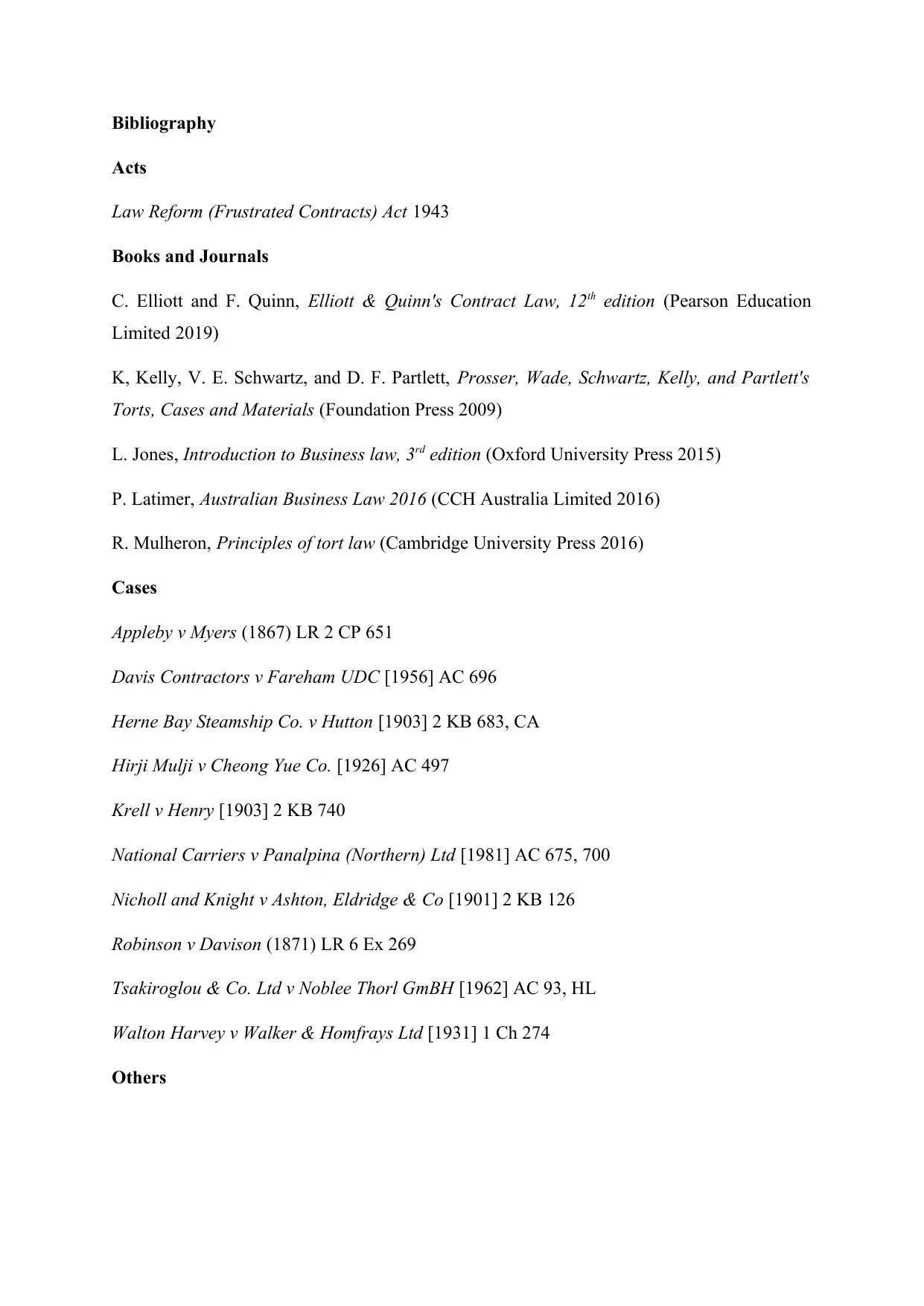
Bibliography
Acts
Law Reform (Frustrated Contracts) Act 1943
Books and Journals
C. Elliott and F. Quinn, Elliott & Quinn's Contract Law, 12th edition (Pearson Education
Limited 2019)
K, Kelly, V. E. Schwartz, and D. F. Partlett, Prosser, Wade, Schwartz, Kelly, and Partlett's
Torts, Cases and Materials (Foundation Press 2009)
L. Jones, Introduction to Business law, 3rd edition (Oxford University Press 2015)
P. Latimer, Australian Business Law 2016 (CCH Australia Limited 2016)
R. Mulheron, Principles of tort law (Cambridge University Press 2016)
Cases
Appleby v Myers (1867) LR 2 CP 651
Davis Contractors v Fareham UDC [1956] AC 696
Herne Bay Steamship Co. v Hutton [1903] 2 KB 683, CA
Hirji Mulji v Cheong Yue Co. [1926] AC 497
Krell v Henry [1903] 2 KB 740
National Carriers v Panalpina (Northern) Ltd [1981] AC 675, 700
Nicholl and Knight v Ashton, Eldridge & Co [1901] 2 KB 126
Robinson v Davison (1871) LR 6 Ex 269
Tsakiroglou & Co. Ltd v Noblee Thorl GmBH [1962] AC 93, HL
Walton Harvey v Walker & Homfrays Ltd [1931] 1 Ch 274
Others
Acts
Law Reform (Frustrated Contracts) Act 1943
Books and Journals
C. Elliott and F. Quinn, Elliott & Quinn's Contract Law, 12th edition (Pearson Education
Limited 2019)
K, Kelly, V. E. Schwartz, and D. F. Partlett, Prosser, Wade, Schwartz, Kelly, and Partlett's
Torts, Cases and Materials (Foundation Press 2009)
L. Jones, Introduction to Business law, 3rd edition (Oxford University Press 2015)
P. Latimer, Australian Business Law 2016 (CCH Australia Limited 2016)
R. Mulheron, Principles of tort law (Cambridge University Press 2016)
Cases
Appleby v Myers (1867) LR 2 CP 651
Davis Contractors v Fareham UDC [1956] AC 696
Herne Bay Steamship Co. v Hutton [1903] 2 KB 683, CA
Hirji Mulji v Cheong Yue Co. [1926] AC 497
Krell v Henry [1903] 2 KB 740
National Carriers v Panalpina (Northern) Ltd [1981] AC 675, 700
Nicholl and Knight v Ashton, Eldridge & Co [1901] 2 KB 126
Robinson v Davison (1871) LR 6 Ex 269
Tsakiroglou & Co. Ltd v Noblee Thorl GmBH [1962] AC 93, HL
Walton Harvey v Walker & Homfrays Ltd [1931] 1 Ch 274
Others
Paraphrase This Document
Need a fresh take? Get an instant paraphrase of this document with our AI Paraphraser

Lexology, ‘The doctrine of frustration in English law’ (2009)
<https://www.lexology.com/library/detail.aspx?g=bd78a422-d7c3-4214-95f5-
031b91438a21> accessed 18 August 2019
<https://www.lexology.com/library/detail.aspx?g=bd78a422-d7c3-4214-95f5-
031b91438a21> accessed 18 August 2019
1 out of 8
Related Documents
Your All-in-One AI-Powered Toolkit for Academic Success.
+13062052269
info@desklib.com
Available 24*7 on WhatsApp / Email
![[object Object]](/_next/static/media/star-bottom.7253800d.svg)
Unlock your academic potential
Copyright © 2020–2025 A2Z Services. All Rights Reserved. Developed and managed by ZUCOL.




